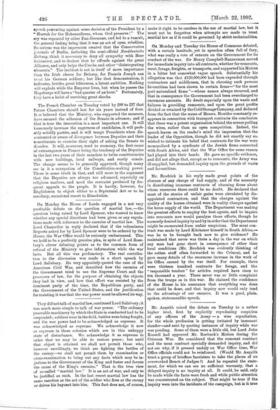Mr. Brodrick in his reply made great points of the
absence of any charge of bad supply, and of the necessity in distributing immense contracts of choosing firms about whose resources there could be no doubt. He declared that most of the stories of unfair gains were circulated by dis- appointed contractors, and that the charges against the quality of the horses obtained were in reality charges against the horse supply of the world. The Department was making the greatest efforts to employ the best agents, and to inquire into remounts now would paralyse those efforts, though he earnestly desired inquiry by and by in order that the Department might be exonerated from unfair suspicions. The meat con- tract was made by Lord Kitchener himself in South Africa,— was he to be brought back now to give evidence? He maintained that never was there a day in the war on which any man had gone short in consequence of other than local conditions (Mr. Brodrick was evidently thinking of the rotten stuff often forwarded to the Crimea), and he gave many details of the enormous increase in the work of his Office caused by the war itself. For example, there were thirteen hundred contracts for forage, and the " responsible tenders " for articles required have risen to ten thousand a year. There never was so little complaint from the troops as in this war. He claimed the confidence of the House in his assurance that everything was done that could be done, and that inquiry now would only tend to the advantage of our enemies. It was a good, plain. spoken, statesmanlike speech.










































 Previous page
Previous page